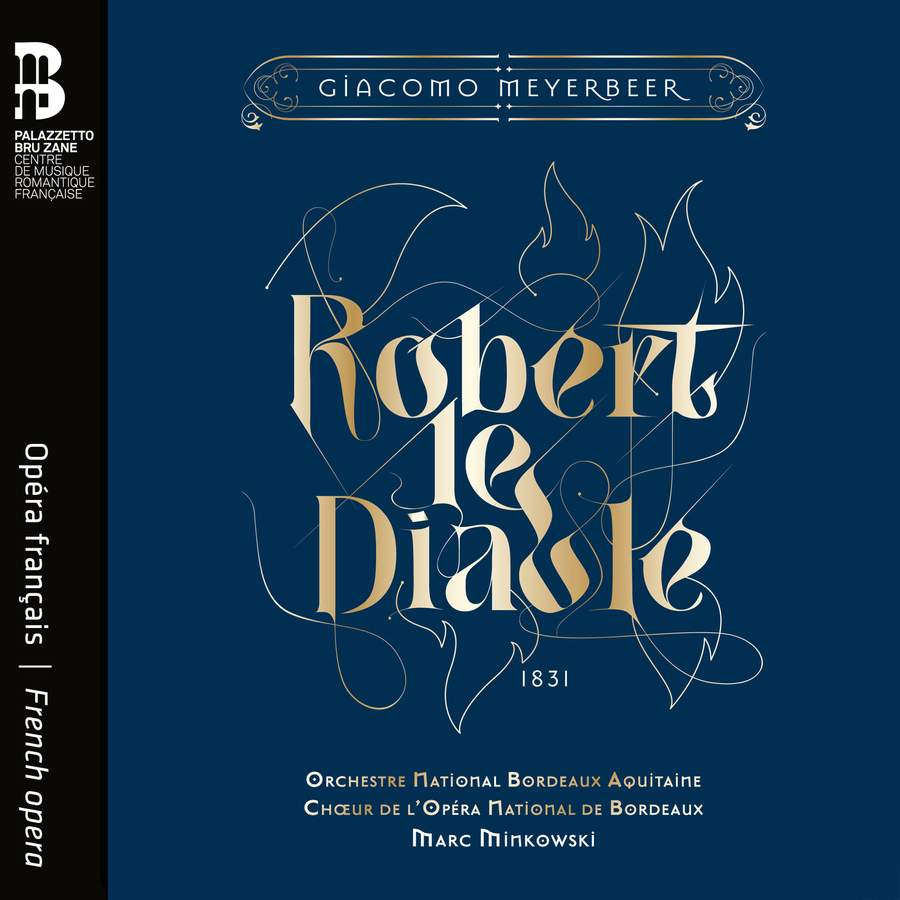MEYERBEER Robert le diable (Minkowski)
View record and artist detailsRecord and Artist Details
Genre:
Opera
Label: Bru Zane
Magazine Review Date: AW22
Media Format: CD or Download
Media Runtime: 217
Mastering:
DDD
Catalogue Number: BZ1049

Tracks:
| Composition | Artist Credit |
|---|---|
| Robert le Diable |
Giacomo Meyerbeer, Composer
Amina Edris, Alice, Soprano Bordeaux National Opera Chorus Bordeaux-Aquitaine National Orchestra Erin Morley, Isabelle, Soprano Joel Allison, Alberti; Priest, Bass-baritone John Osborn, Robert, Tenor Marc Minkowski, Conductor Nico Darmanin, Raimbaut, Tenor Nicolas Courjal, Bertram, Bass Paco Garcia, Herald, Tenor |
Author: Tim Ashley
Robert le diable was first performed at the Paris Opéra on November 21, 1831. The theatre’s new manager, Louis Véron, spared no expense with it, and the premiere caused a musical and theatrical sensation, provoking the awestruck critic of Le Figaro to describe it, in language that uncannily pre-empts Wagner, as a work that ‘makes all the arts work together towards a single goal’. It rapidly became one of the most frequently performed operas of the 19th century – by 1840 it had been heard in 1843 theatres worldwide – and it made Meyerbeer the most popular composer of his age.
Yet nowadays we hear it infrequently, and many approach Meyerbeer with caution. After his death in 1864 envy, rancour and anti-Semitism gradually eroded his standing. His cosmopolitan style, fusing Italianate melody, French declamation and German orchestral subtlety, was deemed eclectic in an increasingly nationalistic age, and the argument that his reputation exceeds his worth, voiced by detractors in his lifetime, still stubbornly clings to him. As a result, we have lost sight of his centrality and importance, of which Marc Minkowski’s superb new recording of Robert, made in tandem with a semi-staging in Bordeaux last year, comes as a forceful reminder.
The opera’s influence was pervasive. The Gothic subject – the moral redemption of the sensualist son of a demon and a mortal woman – fed into the contemporary fashion for diablerie that informed multiple adaptations, operatic or otherwise, of the Faust legend, of which Scribe’s libretto is a variant. More crucially, Robert consolidated the five-act form of French grand opéra that dominated European musical thinking until the fin de siècle, and which no composer who aspired to write for the stage could ignore. Much written in its wake consequently took it as a point of departure, whether by a process of imitation, assimilation or rejection, and its music and dramaturgy echo down through Verdi, Wagner, Liszt, Berlioz, Gounod, Saint-Saëns, Offenbach, Sullivan: the list goes on.
Its impact was not solely musical. Véron’s insistence that it be performed by gaslight with the house lights down was groundbreaking, while the original designs, by Pierre-Luc-Charles Cicéri, brought new grandeur and realism to the stage. The white-clad dancers, meanwhile, of Filippo Taglioni’s infamous ballet of ghostly nuns, unfaithful to their vows and summoned by Robert’s demonic father Bertram to assist in luring his son to damnation, became the prototype for Giselle and Swan Lake, the foundational classics of the dance repertory. No other major work, perhaps, left such a remarkable legacy while itself remaining nowadays so little known.
Minkowski and his Bordeaux forces, however, also powerfully bring home its originality and the striking novelty of the sound world that so startled its first audiences. The powers of darkness and light wage war as much in Meyerbeer’s orchestra as they do on stage, and the battle for Robert’s soul between Bertram and Robert’s principled foster-sister Alice finds parallels in conflicts of instrumental colours, as snarling brass, low woodwind and unsettling timpani tattoos confront the saintly, slow-moving strings and pure, high woodwind that Wagner effectively filched for Elisabeth in Tannhäuser. Minkowski, who first conducted the work in Berlin in 2000, digs deep into its instrumental detail, while slowly and inexorably increasing the dramatic tension in ways that prove gripping throughout.
Meyerbeer’s vocal writing is exacting, its challenges beautifully met. John Osborn’s tone has darkened a bit of late, though his effortless high notes and expressive dynamic range allow him to convey the turmoil in Robert’s mind wonderfully well. As Alice, facing her own fears of evil in order to save him from his father, Amina Edris reveals a burnished lyric soprano and splendid dramatic commitment. Her warmth contrasts with Erin Morley’s brilliance as Isabelle, who loves Robert even as she becomes aware of the darkness within his soul. This is a sensational performance, all staggering coloratura, an electrifying top E in her Act 2 scena and real depth of feeling in her Act 4 cavatina, the most familiar passage in the score. Bertram, meanwhile, is played by Nicolas Courjal, darkly handsome, occasionally veiled in tone. His invocation of those ghostly nuns could do with a bit more malign majesty but he’s persuasive in his telling depiction of Bertram’s almost sorrowful affection for the son whose damnation he is nevertheless compelled to seek.
Nico Darmanin, meanwhile, does fine things with the somewhat ungrateful role of Alice’s fiancé Raimbaut, while the chorus, placed at times fractionally too far back in a recording that is otherwise scrupulously engineered, are excellent throughout. We’re also given a fuller edition of the score than the handful of rival versions, though there are still some cuts, mostly of choral repetitions and within recitatives. It all adds up to a formidable re-evaluation of a seminal if neglected work, as well as being a remarkable achievement in its own right. Bru Zane should be commended for tackling it, and I cannot recommend it too highly.
Discover the world's largest classical music catalogue with Presto Music.

Gramophone Digital Club
- Digital Edition
- Digital Archive
- Reviews Database
- Full website access
From £8.75 / month
Subscribe
Gramophone Full Club
- Print Edition
- Digital Edition
- Digital Archive
- Reviews Database
- Full website access
From £11.00 / month
Subscribe
If you are a library, university or other organisation that would be interested in an institutional subscription to Gramophone please click here for further information.




